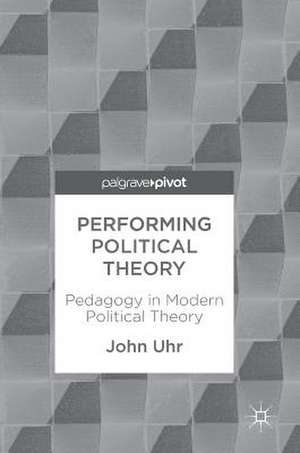Performing Political Theory: Pedagogy in Modern Political Theory
Autor John Uhren Limba Engleză Hardback – 9 feb 2018
This book examines the performative role of influential thinkers in the history of modern Western political thought. The case studies examine influential political philosophers who saw their writing role ‘performatively’, as an exercise in pedagogy designed to generate a new type of political following among their readers. Machiavelli, Mill and Nietzsche wrote classic works in political theory (The Prince, On Liberty, Genealogy of Morals) to reform and reshape their readers’ ability to think and act politically. Thinkers become performative through what they write in their public performance; and contemporary academic teachers can use this to great pedagogical effect in helping students ‘get the point’ of political theorising. This book examines how a small sample of classic theoretical performers wrote their remarkable public works.
John Uhr draws on neglected or forgotten lessons on performative writing from past masters ofliterary criticism like Lord Shaftesbury, R G Collingwood and John Dewey, all of whom can help those now teaching the history of modern political thought to enable students to learn the performance of politics acted out by modernising thinkers capable of writing in ways similar to Machiavelli, Mill and Nietzsche.
Preț: 127.44 lei
Nou
Puncte Express: 191
Preț estimativ în valută:
24.38€ • 25.46$ • 20.14£
24.38€ • 25.46$ • 20.14£
Carte disponibilă
Livrare economică 25 martie-08 aprilie
Livrare express 08-14 martie pentru 28.98 lei
Preluare comenzi: 021 569.72.76
Specificații
ISBN-13: 9789811079979
ISBN-10: 9811079978
Pagini: 147
Ilustrații: XIII, 121 p.
Dimensiuni: 148 x 210 x 18 mm
Greutate: 0.31 kg
Ediția:1st ed. 2018
Editura: Springer Nature Singapore
Colecția Palgrave Pivot
Locul publicării:Singapore, Singapore
ISBN-10: 9811079978
Pagini: 147
Ilustrații: XIII, 121 p.
Dimensiuni: 148 x 210 x 18 mm
Greutate: 0.31 kg
Ediția:1st ed. 2018
Editura: Springer Nature Singapore
Colecția Palgrave Pivot
Locul publicării:Singapore, Singapore
Cuprins
1. Introduction: Politics and Pegagogy.- 2. Reading Dewey.- 3. Reading Shaftesbury.- 4. Reading Machiavelli's The Prince.- 5. Reading Mill's On Liberty.- 6. Reading Nietzsche’s Genealogy of Morals.- 7. Conclusion: Reading Collingwood.
Notă biografică
John Uhr is Professor of Political Science at the Research School of Social Sciences, Australian National University. He was formerly Director of the Centre for the Study of Australian Politics, of the Policy and Governance Program, Crawford School of Public Policy, and of the Parliamentary Studies Centre at the Australian National University. He teaches two courses in political theory, namely, ancient classical political theory and the history of modern political theory. He has published Deliberative Democracy in Australia (1998), Terms of Trust (2005), Prudential Public Leadership (2015), and co-edited and contributed to Public Leadership (2008), How Power Changes Hands (2011), Studies in Australian Political Rhetoric (2014), and Eureka: Australia’s Greatest Story (2015).
Textul de pe ultima copertă
This book examines the performative role of influential thinkers in the history of modern Western political thought. The case studies examine influential political philosophers who saw their writing role ‘performatively’, as an exercise in pedagogy designed to generate a new type of political following among their readers.
Uhr draws on neglected or forgotten lessons on performative writing from past masters of literary criticism like Lord Shaftesbury, R. G. Collingwood and John Dewey, all of whom can help those now teaching the history of modern political thought to enable students to learn the performance of politics acted out by modernising thinkers capable of writing in ways similar to Machiavelli, Mill and Nietzsche.
John Uhr is Professor of Political Science at the Research School of Social Sciences, Australian National University.
Caracteristici
Provides close analysis of core texts in modern Western political theory Explores the performative dimension in political theory and provides extended analysis of theory as performance Utilises forgotten lessons from past masters to provide an effective guide to teaching the history of modern political thought
